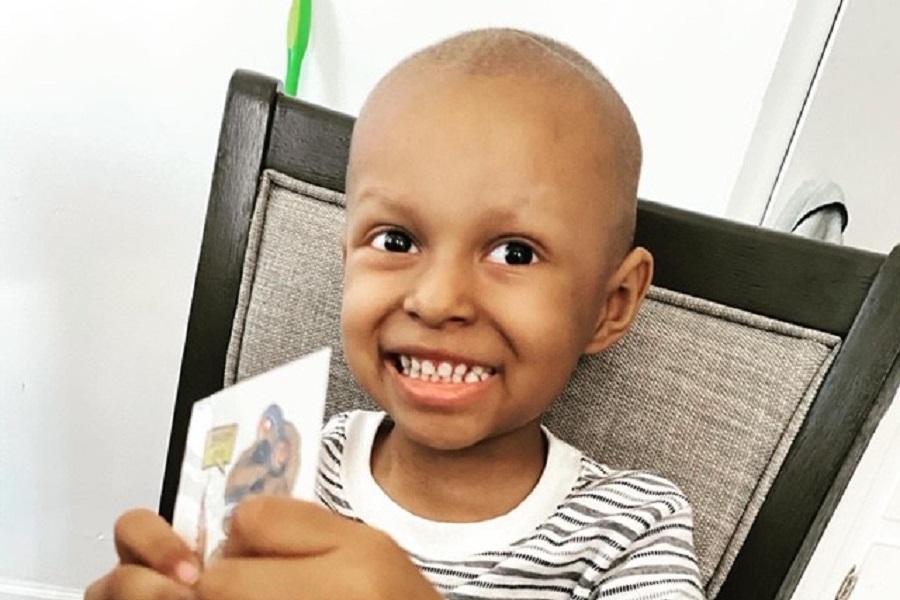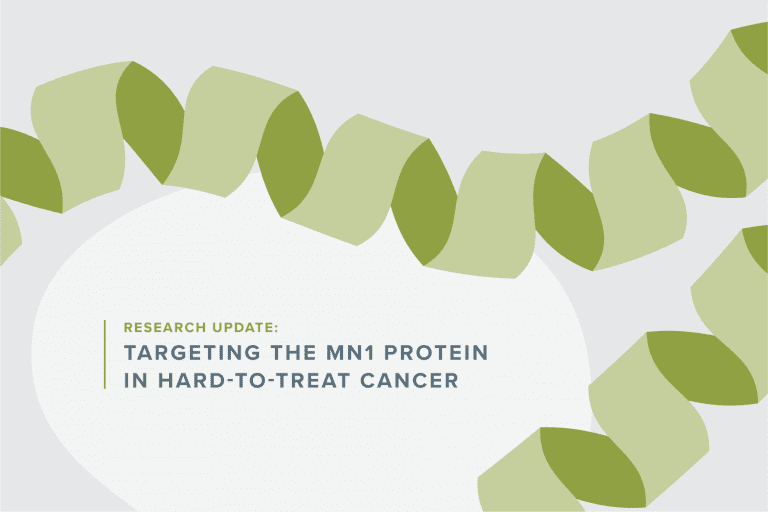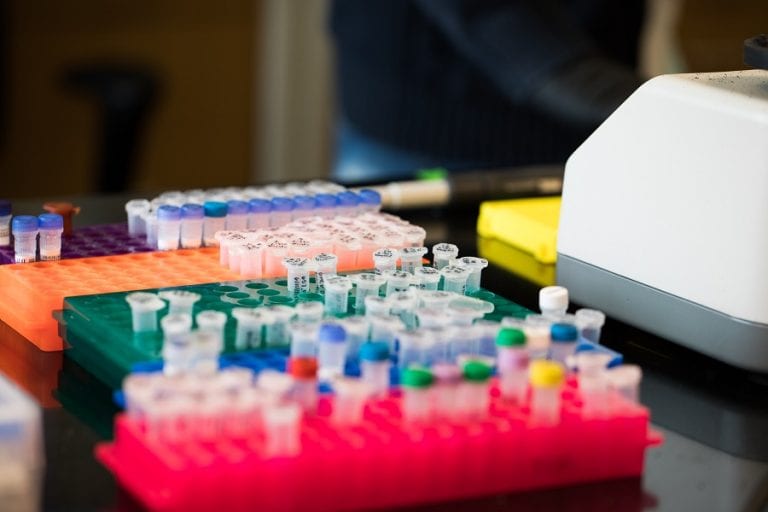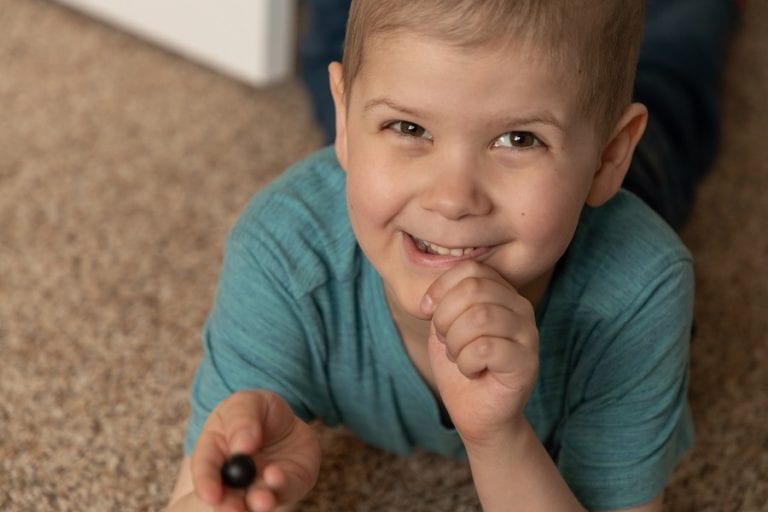The first tiny clue of cancer was hidden in then-2-year-old Maurice’s smile.
“We first noticed something was wrong when we were looking at a picture of Maurice smiling,” said Patricia, Maurice’s mom. One of his chubby cheeks looked bigger than the other, but nobody thought much of it at the time. Then a bump started poking out under his right earlobe. After a month, the bump was visibly bigger. Maurice also wasn’t gaining weight or eating much, and Patricia said he wasn’t himself.
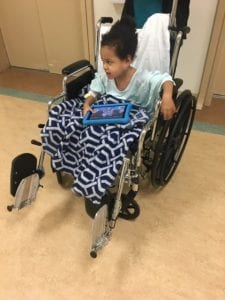
Maurice at diagnosis. A large bump is visible behind his ear.
“He looked sad, like he wasn’t feeling good, so we took him into the pediatrician,” she said.
Maurice’s doctor originally thought it was just an ear infection, but something in Patricia knew it was something more. She wasn’t going to wait months to find out what was giving her that unsettled feeling, so she took Maurice to the Emergency Room and demanded answers. That day, a scan revealed a tumor that was not just behind Maurice’s ear, but creeping up towards his temple and into his jaw, pushing his baby teeth inward and making it impossible for Maurice to open his mouth more than an inch. Doctors ordered a biopsy to confirm what Patricia most dreaded.
“I remember the surgeon took me into a different room to talk, and I knew something was really wrong, because all the other parents were getting updates in the lobby,” Patricia said. “He told me, ‘None of us wanted it to be this, but it’s a malignant tumor.’ He didn’t say ‘cancer,’ but I knew what that meant.”
Grueling Treatment
Maurice was admitted to the hospital on December 10. On December 13, doctors confirmed he had cancer, and later confirmed the specific type – alveolar rhabdomyosarcoma. He started treatment right away, not leaving the hospital until January 1. Restrictions due to COVID-19 meant that only one parent was allowed with him at a time in the hospital, and other visitors were turned away. Maurice’s dad, Tyrone, and big sister, Analiah, can’t come with him when he spends time in the hospital, and Patricia rarely gets a break. For every scary procedure, every port access, every time doctors had to put her 3-year-old son under anesthesia, Patricia was the one there holding his hand.
“It’s really hard to watch him shaking in pain, or saying that he wants to stop, or even just to watch him not really be able to understand what’s going on,” Patricia said.
Since December, Maurice’s treatments for rhabdomyosarcoma included:
- 36 rounds of chemotherapy
- 28 rounds of radiation
- 176 days in the hospital
- A g-tube in his stomach because sores caused by the radiation made it painful to eat
- A port in his chest to deliver chemotherapy
“As a parent, you know there are some battles you have to prepare your child for, and educate them about what they’ll have to face in life,” Patricia said. “But you can’t prepare a 3-year-old for something like cancer, something you never thought was going to happen.”
Maurice’s Personality
When he’s feeling well, Maurice is a bundle of personality – nurses and family members nicknamed him “Boss Baby” after his favorite movie, because of his chatty and outgoing nature. At only 3 years old, he wants to be independent whenever he can, demanding that he can eat his Jell-O all by himself. When he has the energy, he’ll be bouncing off the walls and babbling about his favorite cars and trucks. Patricia says being in treatment has shown her how compassionate her son is to other kids, because he knows what they are going through.
“If he hears a baby or another kid crying, he wants to know if they’re okay,” Patricia said. “He’ll yell out his hospital room door saying ‘It’s okay!’ to try to comfort them.”
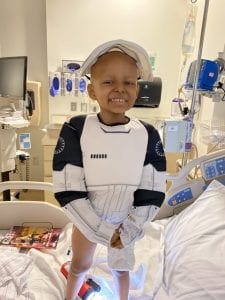
Maurice in the hospital
After a few traumatic experiences with port access and his g-tube, Maurice is very anxious leading up to certain medical procedures, but he’s always sweet to his nurses afterwards. Patricia laughs when she says his reward after particularly scary appointments is a Vanilla Bean Frappuccino from Starbucks. She savors the happy moments so much more now, but thinking too far into the future is daunting.
“It’s hard to think about it without getting emotional,” Patricia said. “We want to rejoice in that moment when he’s doing fine, but I’m always thinking, is this going to be the last time I see my child with this energy and spirit? Is he going to stop responding to treatment? Any time we spend with him, that’s in the back of our minds.”
So Much More to Do
One of the hardest things to watch Maurice go through has been the terrible side effects of his cancer treatments. Since his rhabdomyosarcoma tumor site is near his throat, radiation causes sores in his throat and all through his GI tract, making eating painful.
“If the sores were really bad, he would curl forward and hold his stomach while trying to walk,” Patricia said.
And it’s not just sores – harsh chemotherapy means Maurice’s left eye is losing focus, and his left leg drags a little when he tries to walk. Most of Patricia’s trips to the Emergency Room have been because of side effects of treatment, not necessarily the cancer itself. Patricia said she was incredulous when she learned how little government funding childhood cancer research receives.
“I think about it constantly. How is it that they get so little funding? They’re children. How is it that we have new treatments being developed for adults, but for our kids, it’s old protocols from the 80s or 90s? I just don’t understand how we aren’t doing more for them.”
Today, Maurice is still fighting the battle, but because there’s so little research on alveolar rhabdomyosarcoma and the treatments used to fight it, his next steps are unclear. He’s still receiving chemotherapy to ensure any remaining cancer cells that can’t be detected are killed, but Patricia wants more for her son and all others fighting this battle. She’s decided to advocate for better, safer treatments, so no family has to go through what her family is experiencing.
“As a mom, when this happens to your child, you feel an obligation to speak up,” she said. “My mother was an immigrant, so if things were happening medically with me, she couldn’t always speak up for me. But I can speak up for Maurice, I can reach out of my comfort zone and talk about what we’re experiencing, because other families are experiencing this too, and instead of not knowing what the plan is going to be, we need to know there is medicine out there that will help! Our children deserve normal childhood experiences. Parents should not have to wonder if they will ever get to see their child grow up!”
Fund Research for Kids Like Maurice
Today's treatments for kids like Maurice haven't improved in decades, because childhood cancer research receives too little funding. But it doesn't have to be this way. Your donation helps researchers move their lifesaving work forward.

